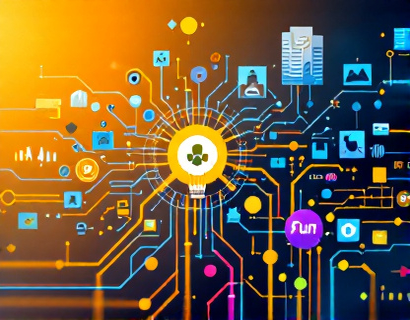Transforming Education with AI-Driven Chatbots: A Comprehensive Guide
The integration of artificial intelligence in educational settings has opened new avenues for learning, making knowledge more accessible and personalized than ever before. Among these innovations, AI-driven educational chatbots stand out as a transformative tool, offering specialized insights to students, families, and educators. This article delves into the capabilities and benefits of these chatbots, focusing on how they deliver industry-relevant knowledge and services through verified content, ensuring a safe and enriching experience for all users.
The Role of AI Chatbots in Education
AI chatbots are designed to simulate human-like conversations through artificial intelligence, enabling them to interact with users in a conversational manner. In the context of education, these chatbots serve as virtual assistants that provide tailored information, answer queries, and guide users through complex topics. For students, they offer an interactive platform to explore subjects in depth, for families, they provide resources and support to aid in the learning process, and for educators, they supply tools to enhance teaching methods and student engagement.
Specialized Insights for Students
For students, AI chatbots are invaluable resources that cater to their specific learning needs. These chatbots can deliver content that is not only accurate but also engaging, using a variety of formats such as text, images, and videos. One of the key features of these chatbots is their ability to provide specialized insights into various industries and subjects. By accessing a vast database of verified information, chatbots can offer detailed explanations, case studies, and real-world applications that help students understand complex concepts more effectively.
For instance, a student interested in technology can engage with the chatbot to learn about the latest advancements in AI, robotics, or cybersecurity. The chatbot can provide step-by-step guides, interactive tutorials, and links to reputable sources for further reading. This level of personalized and verified content ensures that students receive accurate and up-to-date information, enhancing their learning experience and preparing them for future careers.
Support for Families
Families play a crucial role in the educational journey of their children, and AI chatbots can significantly support this role. Parents and guardians often seek ways to assist their children with homework, understand their progress, and stay informed about educational trends. AI chatbots can serve as a reliable source of information, offering guidance on how to support their children's learning, tips for effective study habits, and resources for additional educational activities.
Moreover, chatbots can facilitate communication between parents and educators by providing a platform for real-time updates and discussions. For example, a parent can ask the chatbot about their child's performance in a particular subject, and the chatbot can provide insights based on the child's academic records and learning patterns. This not only keeps parents informed but also empowers them to take proactive steps in their child's education.
Enhancing Educator Resources
Educators are the backbone of the educational system, and AI chatbots can greatly enhance their capabilities. Teachers and instructors can use these chatbots to access a wealth of teaching resources, including lesson plans, interactive activities, and assessment tools. The chatbot can suggest customized lesson plans based on the curriculum and the specific needs of the students, helping educators to create more engaging and effective learning experiences.
Additionally, chatbots can assist educators in staying updated with the latest educational research and teaching methodologies. By providing summaries of recent studies and articles, the chatbot helps teachers incorporate evidence-based practices into their classrooms. This continuous access to verified and relevant information ensures that educators are well-equipped to meet the evolving needs of their students.
Ensuring Content Verification and Safety
One of the most significant advantages of AI chatbots in education is their commitment to content verification. In an era where misinformation can spread rapidly, ensuring that the information provided to students, families, and educators is accurate and reliable is paramount. These chatbots are designed to cross-reference data from multiple trusted sources, providing users with verified content that meets high standards of quality and accuracy.
Furthermore, the safety of users, especially children, is a top priority. AI chatbots can be configured to operate within strict guidelines that prevent the dissemination of inappropriate content. Child-friendly versions of these chatbots are specifically designed to cater to younger audiences, using age-appropriate language and avoiding any sensitive topics. This ensures that children can explore and learn in a secure and controlled environment.
Interactive Learning Experiences
AI chatbots are not just sources of information; they are interactive tools that can enhance the learning experience through dynamic conversations. Students can ask questions, engage in discussions, and receive immediate feedback, making the learning process more interactive and engaging. For example, a student struggling with a math problem can ask the chatbot to explain a concept, work through a problem step-by-step, and even provide additional practice exercises.
These interactive features not only make learning more enjoyable but also help in reinforcing understanding. The chatbot can adapt to the user's pace and style, offering explanations in different formats to cater to diverse learning preferences. This personalized approach ensures that each user receives the support they need to succeed.
Promoting Collaboration and Community
AI chatbots can also foster a sense of community among students, families, and educators. By creating forums and discussion groups within the chat platform, users can connect with peers, share resources, and collaborate on projects. This community aspect encourages knowledge sharing and mutual support, enriching the educational experience for everyone involved.
For instance, students can join study groups to work on group assignments, while educators can create professional networks to exchange teaching strategies and best practices. Families can connect with other parents to share tips and resources for supporting their children's education. These connections not only enhance the learning experience but also build a supportive network that extends beyond the classroom.
Future Prospects and Challenges
As AI technology continues to advance, the potential for educational chatbots to transform learning is immense. Future developments may include more sophisticated natural language processing, enhanced emotional intelligence, and deeper integration with educational platforms and tools. These advancements will further improve the user experience, making chatbots even more effective and intuitive.
However, with these advancements come challenges that need to be addressed. Ensuring the ethical use of AI, protecting user privacy, and maintaining the quality of content are critical issues that must be managed carefully. Educational institutions and developers must work together to establish robust guidelines and standards to address these concerns and maximize the benefits of AI chatbots in education.
Conclusion
AI-driven educational chatbots represent a significant leap forward in providing specialized insights and support to students, families, and educators. By delivering verified content, ensuring safety, and enhancing interactive learning, these chatbots are poised to play a vital role in the future of education. As the technology continues to evolve, the potential for positive impact in educational settings is vast, offering a promising path toward more personalized, engaging, and effective learning experiences.











































